Proof of Collusion, Chapter 4: The Campaign Begins
Proof is publishing the entirety of 2018 New York Times bestseller Proof of Collusion for free. Sign up for Proof as a free subscriber to get each chapter in your inbox. The comment fields are public.
If you would like to become a full subscriber to Proof for just $5/month, click below:
{Note: The thousands of endnotes—each pointing to major-media citations—that appear in the print edition of this book are exclusively in that volume. Click here to purchase Proof of Collusion (by Seth Abramson, first published by Simon & Schuster in 2018) in print. If you would like to comment in the comment fields below, feel free to do so whether you are a paid Proof subscriber or not. Comments may be lightly moderated if/as it becomes necessary. Note that Proof of Collusion is only 300 pages of a four-book, 2,500-page series, so this volume is just one piece of a massive trove of evidence relating to the political career of Donald Trump.
This text has been carefully reviewed by a team of lawyers and professional fact-checkers at a cost in the tens of thousands of dollars. See the print edition of this book for all citations and endnotes, which are implicitly incorporated into this re-publication. This re-publication also incorporates all five volumes of the 2019 Senate Intelligence Committee Report on Russian Interference in the 2016 United States Presidential Election and the two-volume Mueller Report, which can be found here and here, respectively. Any disparity between this book and those reports—though this author isn’t aware of any, and indeed these texts can and should be read in concert with one another—should be resolved in favor of the latter two federal reports.
Any typographical errors in the text below have been accidentally introduced as a result of the transition of the text from a print to a digital format, and do not appear in the print edition. The text here is otherwise identical to the text of the print edition, excepting a small number of minor edits made solely to maximize clarity. The substance of the work remains untouched.}
Table of Contents
The chapter you are now reading is in bold. Any chapters already published are active links to those chapters as published here at Proof in 2023.
Introduction: A Theory of the Case
Date: October 2018
Chapter 1: Russia and the Trumps
Dates: 1987 to 2012
Chapter 2: Trump and the Agalarovs
Date: 2013
Date: November 2013
Chapter 4: The Campaign Begins
Dates: 2013 to 2015
Chapter 5: The National Security Advisory Committee
Dates: January to March 2016
Chapter 6: The Mayflower Hotel
Date: April 2016
Chapter 7: The Backchannels
Dates: May to June 2016
Chapter 8: The Republican National Convention
Date: July 2016
Chapter 9: The Hunt for Her Emails
Dates: July to September 2016
Chapter 10: The October Surprise
Date: October 2016
Chapter 11: The Transition
Dates: November 2016 to January 2017
Chapter 12: The Firings of Flynn and Comey
Dates: February to May 2017
Chapter 13: Testimony and Plea
Dates: June to December 2017
Chapter 14: A Nation in Suspense
Date: 2018
Afterword: The Death and Rebirth of America
Date: 2019
Chapter 4: The Campaign Begins
2013 to 2015
Summary
Not long after the 2012 presidential election, the Kremlin begins its preparations for the 2016 election in the United States, dispatching two spies to America with the goal of infiltrating the right-wing National Rifle Association and creating a backchannel between Moscow and national leaders of the Republican Party. At the same time, the Kremlin becomes more aggressive in its efforts to reach out to Donald Trump, as the signs that he is going to run for the U.S. presidency are by mid-2013 unmistakable.
The Kremlin is successful in its plan to infiltrate the NRA, as well as in its efforts to push Trump toward a foreign policy more favorable to Russia by dangling Moscow land-development deals in front of him. It is unclear as of 2015 whether the Kremlin plans to simply influence NRA brass into contributing a record amount of money to Trump’s 2016 presidential campaign or whether it wants to funnel illegal campaign contributions directly to Trump through the organization. In 2018, Special Counsel Robert Mueller will investigate both possibilities. What will be clear by Election Day 2016 is that an unprecedented volume of NRA political contributions was essential to the success of Trump’s 2016 presidential run.
As soon as Trump announces his candidacy on June 16, 2015, at Trump Tower in New York City, he begins lauding Russian president Vladimir Putin, denigrating sanctions on Russia, and harping on the need for better relations with the Kremlin—even as a longtime business partner of his with ties to both the Kremlin and the Russian mafia is trying to help him parlay his pro-Russia foreign policy into a sizable payday in the Russian real estate market. Meanwhile, both Trump and his eldest son Donald Trump Jr. strengthen their bonds with the NRA—which will, in May 2016, issue an unusually early endorsement of Trump.
As the Weekly Standard will note in February 2017, “There are many claimants to the honor of having nudged Donald Trump over the top in the presidential election. But the folks with the best case are the National Rifle Association and the consultants who made their TV ads.”
The Facts
From 2013 through 2017, Alexander Torshin (a.k.a Aleksandr Porfiryevich Torshin)—a Russian politician with ties to Russian intelligence—and his mentee Maria Butina, a twentysomething Russian student who will eventually be charged with Conspiracy and Acting As An Unregistered Foreign Agent, seek to infiltrate the NRA as part of a plot to create a backchannel between the Kremlin and Republican Party leaders. The tripartite plot involves making a social connection with powerful NRA members and GOP operatives; constructing a bogus “gun rights” organization in Russia to create sympathy of purpose with American gun owners; and finally encouraging the NRA to give generously to one 2016 presidential candidate in particular: Donald Trump.
As related by Rolling Stone in April 2018, Torshin is a member of Putin’s political party with “close ties to Russia’s internal security service, the FSB, which awarded him a medal in 2016.” According to the CIA’s former Russian operations chief Steven Hall, “[Putin] decided Mr. Torshin [was] going to be the guy to do it for him”—“it” being, as Rolling Stone phrases it, “exploit[ing] the American gun lobby.” That exploitation involves “forg[ing] a quick friendship” between NRA president David Keene and a Russian sister organization to the NRA, despite the fact that, as Hall puts it, “the idea of private gun ownership is anathema to Putin.”
As Torshin is working on connecting the Kremlin to powerful NRA members and, later on, Republican politicians, prosecutors in Spain—who, according to Bloomberg, deem Torshin a Russian mafia “boss”—are investigating him for money laundering. In May 2018, Spanish officials, suspecting Torshin of “involvement in money laundering and organized crime”, will turn wiretaps from their investigation to the FBI, saying publicly of the recordings—on which Torshin is referred to by Alexander Romanov, a mob-linked former Russian banker, as “El Padrino”, meaning “godfather”—that “Mr. Trump’s son [Donald Trump Jr.] should be concerned.”
Prosecutors eventually decide not to charge Torshin—not due to lack of evidence, but because they don’t believe the Kremlin would extradite him to Spain.
In 2013, the then twenty-four-year-old Maria Butina begins a romantic relationship with the then fifty-four-year-old Paul Erickson, an influential GOP operative and NRA member. Per a July 2018 Mother Jones summary of NRA-Russia collusion and subsequent indictments against Butina, Butina was hoping, through Erickson, to establish a backchannel between the Kremlin and Republican leadership. In short order she is cohabiting with Erickson, and Erickson has begun paying many of her expenses through a company established for this purpose called “Bridges, LLC.”
By the fall of 2013, Erickson has assisted Butina in getting close to NRA president David Keene. In November, Butina and Torshin host Keene in Moscow. In January 2014, Keene publishes an essay by Torshin in the Washington Times, where Keene is editor of the opinion pages. Torshin and Butina both then “join Keene for meetings” at the 2014 NRA convention in Indianapolis, Indiana. In the fall of 2014, Erickson travels to Moscow with Butina for a gun-rights event.
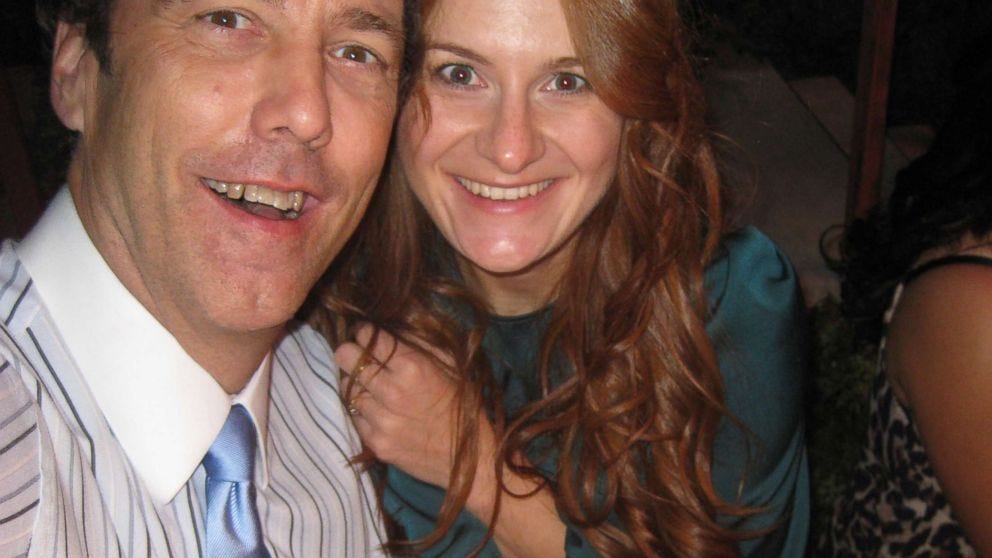
In February 2015, Trump declines to renew his contract with the NBC reality show The Apprentice, confirming something that had been an open secret in GOP circles since 2013—that he plans a run for the presidency. The assumption that Trump will seek the White House in 2016 is predicated in part on statements made by Trump to Republican leaders in New York in December 2013, at which point he “predicted he would begin [his presidential run] in 2015.”
In March 2015, Trump and Torshin attend the annual NRA conference in Nashville, Tennessee, and have a “jovial exchange” according to Torshin. Butina is also at the conference and has a “private meeting” with a “political candidate”; it’s not known whether the candidate was Trump. Regardless, Torshin leaves the NRA conference considering himself now an “acquaintance” of Trump’s. On November 8, 2015, he will tweet from his personal Twitter account, in response to allegations of racism against Trump, “I know Donald Trump (through NRA). [He is] a decent person.” In 2017, he will secure an invite to the National Prayer Breakfast and, afterward, a spot on then-President Trump’s schedule for a private audience. According to five Yahoo News sources, Trump’s team cancels the post–Prayer Breakfast Trump-Torshin meeting because Torshin is suspected of being a “godfather” in the Russia mafia. The White House will later say that no such meeting was ever scheduled and—for good measure—Trump will deny having ever met Torshin at the White House or anywhere else.
From the moment Trump formally announces his presidential candidacy on June 16, 2015, he tends to discuss two topics with great regularity: first, how good he will be at “getting along” with the Russians and “making deals” with them; second, how well he knows Vladimir Putin and, moreover, Putin’s perspective on whom he can (and whom he wants to) “make deals” with.
Less than a month after he announces his candidacy, on July 11, 2015, Trump is at a libertarian event in Las Vegas called “FreedomFest” conducting a Q&A session. He calls on a young woman from Russia—as we now know, Maria Butina—who says she would like to know Trump’s position on sanctions, and also what sort of relationship he’d like to have with Putin and Russia if he’s elected president. The press conference is being recorded. Trump answers her question by saying, “I know Putin, and I’ll tell you what, we get along with Putin. Putin has no respect for President Obama. Big problem. Big problem. . . . I believe I would get along very nicely with Putin. . . . I don’t think you’d need the sanctions. I think that we would get along very, very well. I really believe that.” Trump also expresses the view that the United States “has driven [Russia and China] together with the big oil deals that are being made”—the implication being that it would be better for Russian oil to flow westward rather than eastward, and that the anti-Russia policies of the Barack Obama administration have engendered greater Russian-Chinese cooperation.
Ten days after he says at a televised event that he opposes sanctions on Russia, Trump receives an invitation to come to Moscow from Aras Agalarov. The invitation, communicated by Emin Agalarov’s publicist Rob Goldstone to Trump’s secretary, is ostensibly for Aras’s birthday party in November 2015—but contains a promise that Trump can meet with President Putin in person if he comes to the party. Goldstone tells Trump’s secretary Emin will set up the meeting with Putin if Trump agrees to it.
Within sixty days of Trump telling Butina at FreedomFest that he doesn’t see the need for sanctions on Russia, longtime Trump business partner and Russian mafia-linked fixer Felix Sater has approached Trump’s lawyer Michael Cohen with a new business opportunity. Sater has been promising Trump a new Moscow tower deal since 2005 but has been unable to deliver for a decade; now, suddenly, he has a willing investor by the name of Andrey Rozov. Sater and Rozov have both been on the executive board of a Moscow real estate company called Mirax Group since 2008, but until Trump makes his announcement of a presidential run and airs his staunch opposition to American sanctions against Russia, Rozov betrays no interest in partnering with Trump. Now, he agrees to let Sater approach Cohen with the idea.
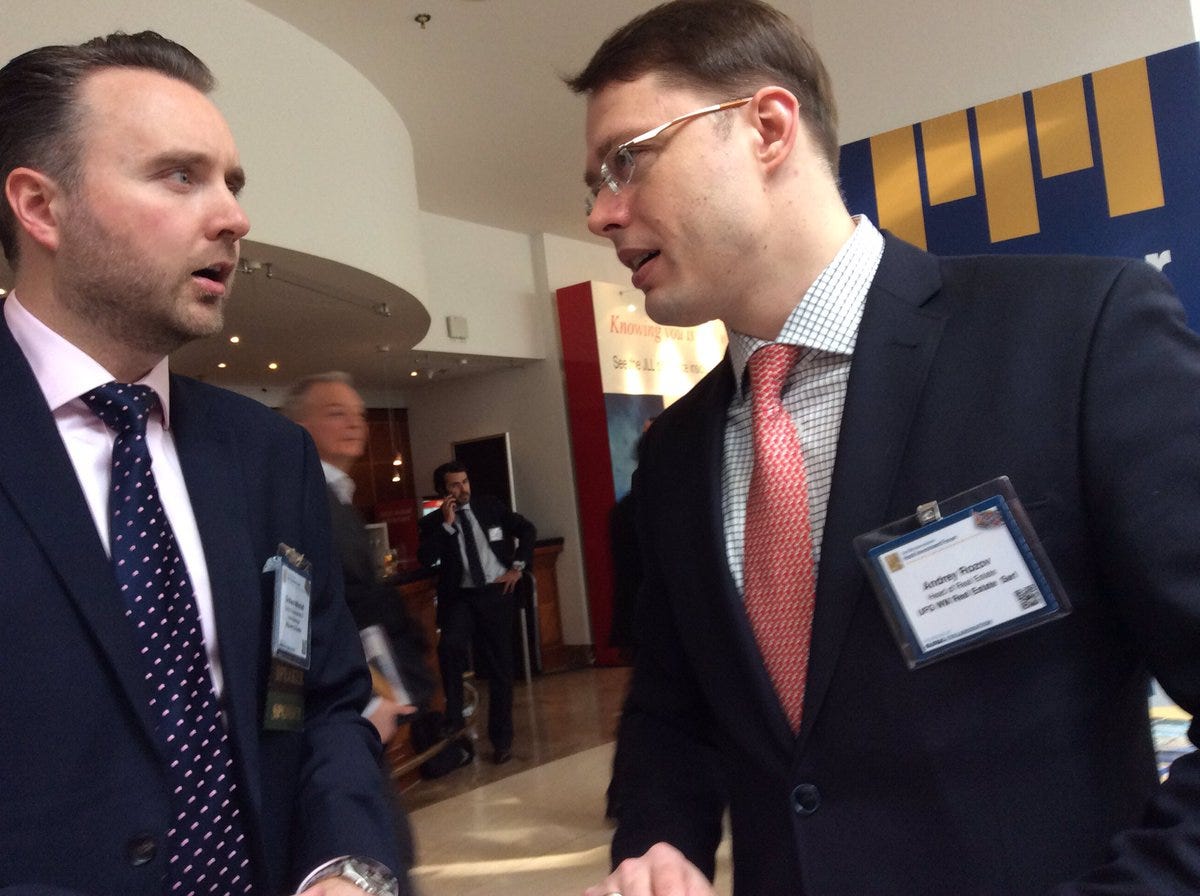
Sater follows a September 2015 email proposing the idea to Cohen and Trump with an October email containing a signed Letter of Intent from Rozov and a note from Sater saying that Trump agreeing to build a Trump World Tower Moscow would “possibly fix relations between the countries [Russia and the United States].” It appears that at least the September communication between Sater and Cohen has been kept from everyone at the Trump Organization but Trump; on September 30, 2015, Alan Garten, the chief legal officer of the Trump Organization, tells ABC News that “there’s really no direct relationship” between Sater and the Trump Organization and “I don’t know that he ever brought any deals.” The statement is false.
In October of 2015—while Cohen is communicating with Sater on a Trump Tower Moscow deal even as his client, Donald Trump, runs for president—Cohen receives yet another offer from Russia (Trump’s third since 2013, at a minimum) to build a Trump Tower in Moscow. This new proposal comes from Russian billionaire Sergei Gordeev, whom the Washington Post calls a “Moscow real estate mogul who served through 2010 as a Russian legislator.” Gordeev indicates, through an intermediary—“an international financier [Gordeev] had worked with in the past, Giorgi Rtskhiladze”, according to the Post—that the deal he’s offering Trump would involve a “Trump-branded residential development.” That month, Gordeev and Rtskhiladze send Cohen a thirteen-page proposal and pictures of the prospective site. Cohen turns down the request, but only because—as he explains to Rtskhiladze—Trump is already working on a deal for a Trump Tower in Moscow.
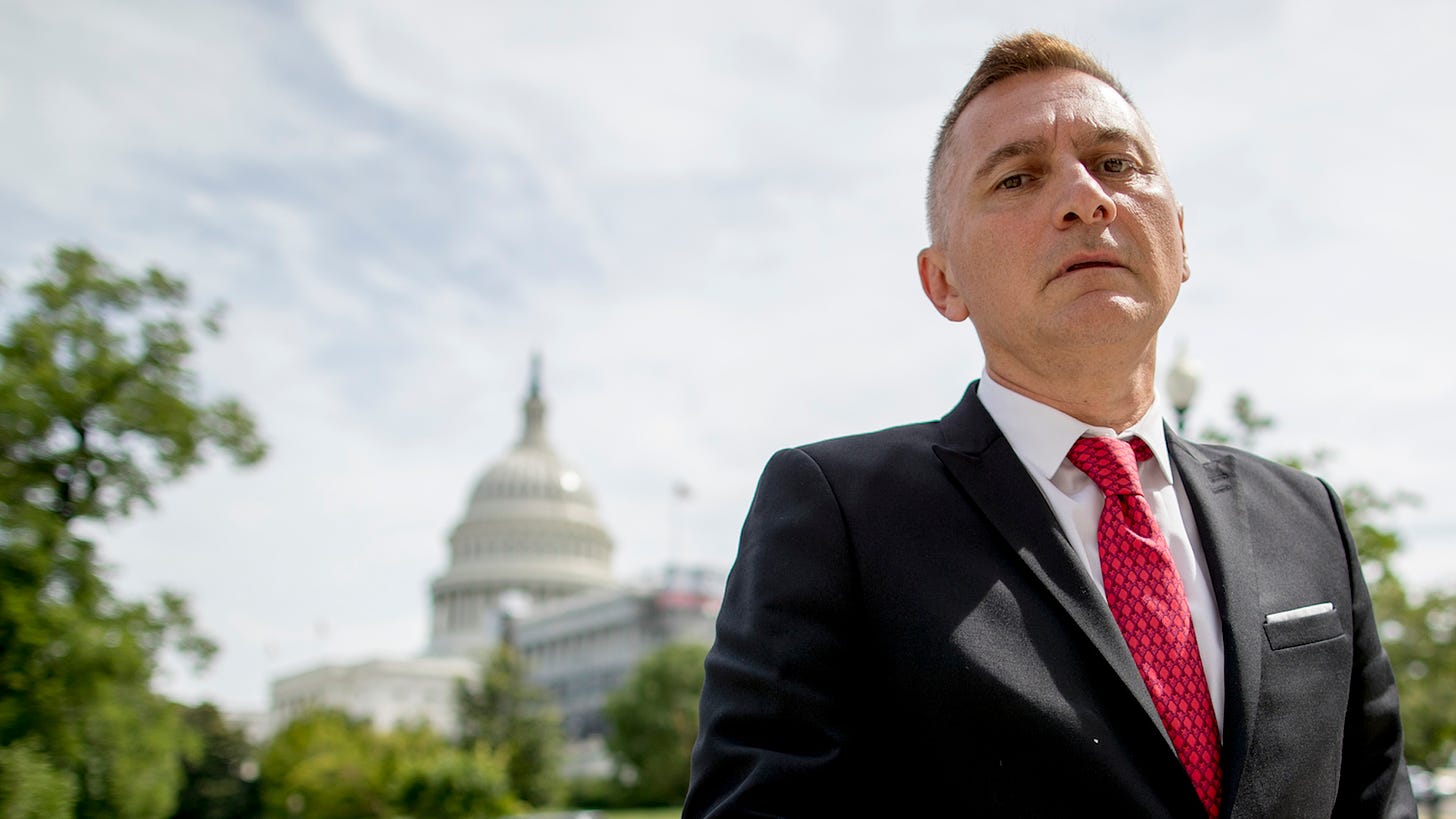
Felix Sater tells Cohen in his October 2015 note that “we” (Sater and Cohen) “will help [Putin] agree on [the] message” the construction of the tower is intended to embody: “that commerce & business are much better and more practical than politics.” Sater tells Cohen and Trump that the goal of this deal is to “help world peace and make a lot of money.” What exactly Trump must do to “help world peace” in order to “make a lot of money” is not specified in Sater’s note, but when Trump mentions Russia on the campaign trail, much of the time he emphasizes the need to get along with Moscow and—more particularly—to make deals with Putin that would include eliminating all U.S. sanctions against Russia. It is the fifth month of his 2016 presidential campaign.
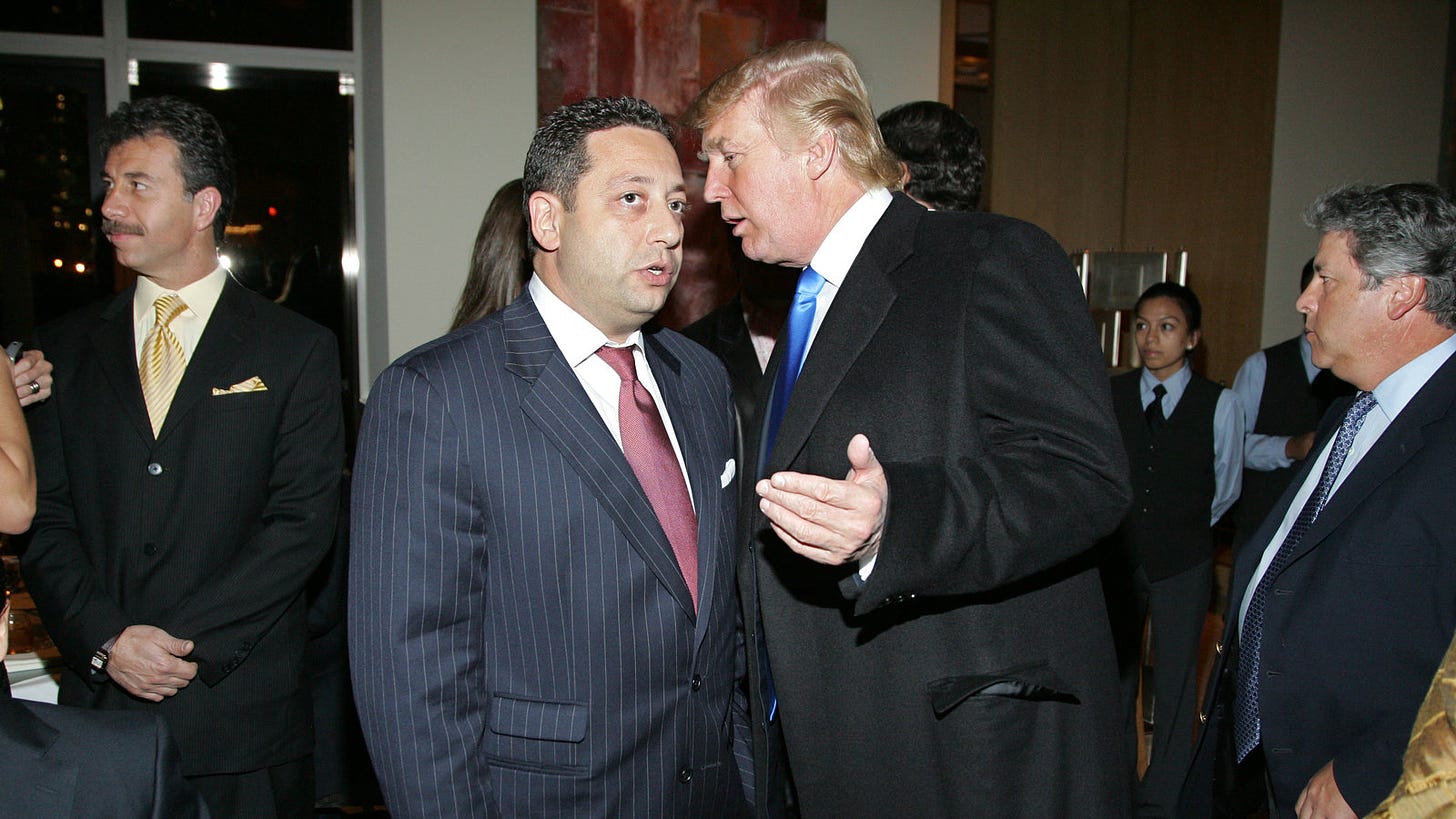
On November 3, 2015, Sater writes Cohen to say, “I know how to play it, and we will get this done. Buddy, our boy can become President of the United States of America and we can engineer it. I will get all of Putin’s team to buy in on this.” By the time he sends this note, Sater has lined up financing for the Trump-Rozov tower with VTB—a then sanctioned Kremlin-owned bank. The next month, however, new sanctions are leveled against VTB, meaning that unless Trump wins the presidency and removes U.S. sanctions on Russia, he won’t be able to get the money Sater has secured for him.
Sater, knowing the connection between Trump’s Russia policy and his ability to get a Trump Tower Moscow approved by the Kremlin, adds in his November 2015 email to Cohen that he is “eager to show video clips to his Russian contacts of instances of Mr. Trump speaking glowingly about Russia, and . . . he would arrange for Mr. Putin to praise Mr. Trump’s business acumen.” “If he [Putin] says it we own this election”, Sater writes Cohen. “America[’]s most difficult adversary agreeing that Donald is a good guy to negotiate [with].” Sater’s view is that Trump announcing—and Putin implicitly blessing—a Trump Tower Moscow in late 2015 or early 2016 will help propel Trump’s presidential campaign forward. It is the most explicit juxtaposition of politics and business that any of Trump’s business associates have proposed to date.
In January 2016, however, this mark will be bested. Cohen contacts Dmitry Peskov, the Kremlin’s spokesman, to directly ask for the Kremlin’s help with Trump’s Trump Tower Moscow deal with Rozov. That Cohen seeks Kremlin assistance on a financial transaction even as Trump is pushing his pro-Russia foreign policy with voters—and that Trump has chosen to hide this transaction not only from voters but from many at his own company—is an indication that Trump and members of his inner circle are working on two simultaneous tracks with the hope that each will reinforce the other.
By late 2015, Alexander Torshin is hosting two dinners in Moscow for a high-level NRA delegation that includes NRA president David Keene, NRA mega-donor Joe Gregory, NRA board member Pete Brownell, and Sheriff David A. Clarke, a Trump supporter who will later become a key Trump surrogate. These men are joined at one of their Moscow dinners by Dmitry Rogozin, a “hardline deputy to Putin” who is at the time (and still is) under U.S. sanctions. During the delegation’s visit, members are also introduced, according to reporting by McClatchy, to other “influential Russian government and business figures.”
In December 2015, retired U.S. Army lieutenant general Michael Flynn, who has been advising Donald Trump and four other GOP candidates on national security issues for at least two months, goes to a gala in Moscow in celebration of the Kremlin’s media outlet, RT, for whom Flynn works as an analyst. He is seated immediately to the right of Putin. Former U.S. ambassador to Russia Michael McFaul will later tell NBC, “Of course, it is not coincidence that General Flynn was placed next to President Putin. Flynn was considered a close Trump advisor. . . . Why else would they want him there?” Flynn will fail to report any of his income from the event—roughly $40,000.
One of the other candidates Flynn is advising is Ben Carson. One of Carson’s national security advisers is George Papadopoulos. Papadopoulos will be hired as a member of Trump’s national security team, after an interview with Trump campaign cochair Sam Clovis and at a time when Flynn and the only just-onboarded Sen. Jeff Sessions (R-AL) constitute the entirety of the Trump campaign’s national security advisory apparatus.
In 2016, the annual NRA conference is held in Louisville, Kentucky, and once again Torshin and Butina attend. Several days before the conference, Butina’s boyfriend, Erickson, writes Trump campaign aide Rick Dearborn to inform the Trump campaign that the Kremlin is “quietly but actively seeking a dialogue with the United States that isn’t forthcoming under the current administration”, adding that “the Kremlin believes that the only possibility of a true reset in this relationship would be with a new Republican in the White House.” Erickson notes that Torshin will attempt to make “first contact” with the Trump campaign at the NRA convention. Erickson adds, “Putin is deadly serious about building a good relationship with Mr. Trump. He wants to extend an invitation to Mr. Trump to visit him in the Kremlin before the election.”
At the same time that Torshin approaches Dearborn through Erickson, he also uses Rick Clay, whom the New York Times describes as “an advocate for conservative Christian causes”, to get the same message to Dearborn: Putin wants to meet with Trump, and Torshin wants to meet with Trump first to set up the meeting. Dearborn sends the email from Clay on to Jared Kushner, who nixes the idea, according to two sources interviewed by the New York Times. It’s unknown who else if anyone Dearborn or Kushner pass the email to after reading it, but what is certain is that in fact Torshin does end up dining with Donald Trump Jr. at the NRA convention just a few days later.
Per Vanity Fair, Trump Jr.’s attorney Alan Futerfas says the two men engaged in no more than “gun-related small talk”, but according to McClatchy and the New York Times, Torshin was in fact trying to set up a one-on-one meeting between himself and candidate Trump at an event honoring wounded veterans being hosted at a location near the convention; he even told the campaign he was bringing a gift to the event for Melania Trump.
NRA expenditures on the 2016 presidential primaries and general election were far higher than the NRA initially reported, and will eventually reach and possibly exceed $70 million according to a McClatchy report in January 2018. The figure is a record-shattering one for the NRA. Trump, who had originally promised voters he would spend $1 billion of his own money on his campaign, by the end of the primary season has spent only about 6.5% of that total—while paying his own companies $12 million from his campaign coffers in reimbursements for travel, lodging, meals, and other services. In May 2016, upon clinching the nomination, he announces that he will not be financing his general election campaign and will take funds from the Republican National Committee (RNC) instead. Massive spending by the NRA and the RNC on Trump’s behalf make it possible for him to abandon his self-funding promise from the primary and nevertheless be adequately funded for the November election.
In the end, the NRA spends more than the billionaire Trump does on his own election.
The FBI and Special Counsel Robert Mueller will eventually reveal they have initiated an investigation into whether Torshin and Butina affected the NRA’s historic outlay of funds on Trump’s behalf. Torshin will be sanctioned by the U.S. Treasury Department and Butina will be indicted, imprisoned, and deported. As noted by Vanity Fair in June 2018, “The FBI and special counsel Robert Mueller are investigating meetings between NRA officials and powerful Russian operatives, trying to determine if those contacts had anything to do with the gun group spending $30 million [in direct support] to help elect Donald Trump—triple what it invested on behalf of Mitt Romney in 2012. Use of foreign money in American political campaigns is illegal.”
On October 4, 2016, just a month before the presidential election, Paul Erickson writes an email to an acquaintance that reads, “Unrelated to specific presidential campaigns, I’ve been involved in securing a VERY private line of communication between the Kremlin and key [GOP] leaders through, of all conduits, the NRA.”
Annotated History
1
From the moment Trump formally announces his presidential candidacy on June 16, 2015, he tends to discuss two topics with great regularity: first, how good he will be at “getting along” with the Russians and “making deals” with them; second, how well he knows Vladimir Putin and, moreover, Putin’s perspective on whom he can (and whom he wants to) “make deals” with.
In an interview with Fox News host Bill O’Reilly in June 2015, Trump remarked, “I was over in Moscow two years ago and I will tell you—you can get along with those people and get along with them well. You can make deals with those people. Obama can’t.” It is unclear how Trump knew, in June 2015, the ease with which he personally could “make deals” with the Russians and that Obama could not. One explanation comes in an interview with Sean Hannity three days after Trump’s conversation with O’Reilly. When asked if he’s ever had contact with Vladimir Putin, Trump answers “yes” and adds, “I was there two years ago. . . . And I got to meet everybody.” When Hannity pressed Trump to confirm that he’d spoken to Putin during the pageant, Trump replied, cryptically, “I don’t want to say”, repeating that answer twice. He also guaranteed that Putin hated Obama, though once again he wouldn’t confirm whether the information had come from Putin himself. The next month—the same month as FreedomFest—Trump told CNN’s Anderson Cooper, referring to Putin, “I get along with him fine. . . . He hates Obama. He doesn’t respect Obama. . . . [H]e has no respect for Obama. Has a hatred for Obama.” Perhaps most telling was a comment Trump made to Cooper about how, as president, he would work to terminate former NSA contractor Edward Snowden’s continued asylum in Russia: “If I’m president, Putin says [to Snowden], hey, boom, you’re gone [from Russia]. I guarantee you this.”
Trump’s 2015 comments assuring American voters that he had met with Putin and indeed knew his mind on presidential politics—at a time when Trump was himself running for president—are so voluminous that only a few of them can be compiled here. On July 15, 2015, Trump told Hannity, “Putin has no respect for President Obama.” On July 26, 2015, he wrote on Twitter, “Putin knows that Obama is a danger to the world. Putin will respect President Trump.” At a July 30, 2015, presser at his golf course in Scotland, he observed that “[Putin] hates Obama.” A March 2017 CNN compendium of Trump-Putin quotes also reveals that Trump assured American voters he would get along with Putin during events on June 16 and 29 (telling the City Club of Chicago, “I had the Miss Universe over there [in Russia] two years ago; I got to know these guys well. We can get along with them well. We can get along with them well”); July 8, 26, and 30; August 12, 14, 20, 23, and 29; and September 23.
2
As related by Rolling Stone in April 2018, Torshin is a member of Putin’s political party with “close ties to Russia’s internal security service, the FSB, which awarded him a medal in 2016.”
According to a May 2018 NPR article, Torshin had spent “years of travel [dating] back to 2009 . . . cultivat[ing] ties with American conservatives.” The article quotes Steve Hall, a retired CIA chief of Russian operations, as stating the following:
[Vladimir] Putin and probably the Russian intelligence services saw [Torshin’s connections] as something that they could leverage in the United States. They reach out to a guy like Torshin and say, “Hey, can you make contact with the National Rifle Association and some other conservatives . . . so that we can have connectivity from Moscow into those conservative parts of American politics should we need them?”
And that’s basically just wiring the United States for sound, if you will, in preparation for whatever they might need down the road.
NPR reported that Torshin took a trip to Alaska in 2009 seeking an audience with Sarah Palin, a request he communicated to the Alaska governor’s office through Russian ambassador Sergey Kislyak. While Palin didn’t meet with Torshin, state records indicate that Alaska’s lieutenant governor, Sean Parnell—now the state’s governor—was slated to meet with him in her stead. He now says that he does not recall the meeting.
Some of Torshin’s U.S. activities puzzle observers. In March 2015, he gave a speech in Washington, in his capacity as deputy governor of the Bank of Russia, that left one attendee, a former U.S. government official, telling NPR that “for anyone at the lunch who is remotely familiar with finance or the world of central banking, he [Torshin] demonstrated no significant expertise in either realm.”
3
Within sixty days of Trump telling Butina at FreedomFest that he doesn’t see the need for sanctions on Russia, longtime Trump business partner and Russian mafia-linked fixer Felix Sater approaches Trump’s attorney Michael Cohen with a new business opportunity. Sater has been promising Trump a new Moscow tower deal since 2005 but has been unable to deliver; now, he has a willing investor by the name of Andrey Rozov. Sater and Rozov have both been on the executive board of a Moscow real estate company called Mirax Group since 2008, but until Trump announces he is running for president, Rozov betrays no interest in partnering with Trump. Now, he agrees to let Sater approach Cohen with the idea.
Cohen and Sater are childhood friends from Brighton Beach, also known as “Little Odessa”, in the southern portion of the New York City borough of Brooklyn, where Sater’s father was a small-time crime boss and Cohen a boy who admired the area’s many Russian émigré gangs from afar. By 2015, Cohen had become Trump’s most loyal foot soldier. As reported by Business Insider in April 2018, Cohen once said, “If you do something wrong [to Mr. Trump], I’m going to come at you, grab you by the neck, and I’m not going to let you go until I’m finished.” It’s no surprise, then, that Cohen has been called Trump’s “pit bull”, and he told Vanity Fair in a September 2017 article that “I’m the guy who would take a bullet for the president. I’d never walk away.”
Cohen, who attended what Politico calls “the worst law school in America”, was found by a judge reviewing his client records to have only three clients: Sean Hannity, GOP fund-raiser Elliott Broidy, and Donald Trump. The Republican National Committee named Broidy RNC Deputy Finance Chair alongside Cohen in April 2017, while Hannity acted as a Trump adviser during the 2016 campaign and has continued throughout Trump’s presidency. Broidy would eventually be caught in a “hush money” payoff of a former mistress almost identical in its mechanism and secrecy to the one Cohen pleaded guilty to orchestrating on Donald Trump’s behalf in August 2018—with Broidy’s mistress using the same Cohen-recommended attorney to negotiate her payment from Broidy that one of Trump’s mistresses used to get a $130,000 payment from Trump.
According to a March 2018 New York Times article, a witness cooperating with Robert Mueller in the Trump-Russia investigation, George Nader, has revealed to the special counsel a year-long effort to turn Broidy “into an instrument of influence at the White House for the rulers of Saudi Arabia and the United Arab Emirates. . . Hundreds of pages of correspondence between the two men reveal an active effort to cultivate President Trump on behalf of the two oil-rich Arab monarchies. . . .High on the agenda of the two men. . . .[is] repeatedly pressing the president to meet privately outside the White House with the leader of the UAE.” The Times further reports Nader offering Broidy more than $1 billion in contracts for the latter’s private security company in exchange for preferred access to Trump by the UAE and its agents, including Nader. It is not yet known what if any conversations Trump’s lawyer, Cohen, had with Broidy about the UAE while Cohen was representing Broidy and both men were Trump-appointed deputy finance chairs at the Republican National Committee.
{Update on July 13th, 2023: The second book in the New York Times bestselling Proof series, Proof of Conspiracy, discusses Trump-Saudi and Trump-Emirati collusion in detail. Elliott Broidy and George Nader are key figures in that lengthy work, which can be purchased here.}
Cohen’s tiny client roster is partly explained by the fact that he was, for a long time, also an executive vice president at the Trump Organization. In testimony before the House Intelligence Committee in December 2017, Donald Trump Jr. explained his belief that, in conversations among executives at Trump Tower, as long as one of the people in the room is a lawyer—or, as applicable, also a lawyer in addition to being a Trump Organization executive—anything said in the room is covered by attorney-client privilege. All that is required, per Trump Jr.’s testimony, is that there be “a lawyer in the room during the discussion.” This is, of course, incorrect; it may explain in significant part some of the utility the Trumps saw in Cohen’s dual roles, however.
In September of 2015, per an ABC News report from August 2017, Sater approached Cohen with what he called a “signature development opportunity”: a chance to build a Trump Tower in Moscow separate from the one Trump had previously agreed to build (and was still under a letter of intent to build) in Moscow’s Crocus City complex with the Agalarovs. At the end of that month, reported ABC, “Trump Organization officials told ABC News that Sater inflated his connections to the company. Alan Garten, a senior Trump Organization attorney, told ABC that ‘there’s really no direct relationship’ between Sater and [the Trump Organization]. ‘To be honest, I don’t know that he ever brought any deals,’ Garten said.” Garten’s statement was inaccurate at best and dishonest at worst: not only had Sater helped secure partners for Trump’s Trump SoHo project—one of the most important projects of Trump’s career—but he’d also sent a number of Russian oligarchs in Trump’s direction.
Whoever had told Garten to deny Sater’s long-standing relationship with the Trump Organization and his ongoing value to Trump’s bottom line was presumably anxious to forestall public discovery of that critical arrangement should Sater’s long-awaited “Moscow deal” finally bear fruit—as looked to be the case by September 2015. Per ABC News, Cohen kept Sater’s proposal from everyone at the Trump Organization except Trump.
Several weeks later, on October 13, 2015, Felix Sater emailed Cohen saying that he had secured an investor for his proposal and was enclosing, for Trump’s signature, a letter of intent. Sater had appended a note to the letter of intent that read, in full, according to a September 8, 2017 story by New York Times reporter Maggie Haberman:
Dear Michael,
Attached is the signed LOI (Letter of Intent) by Andrey Rozov. Please have Mr. Trump counter-sign, signed [sic] and sent [sic] back. Lets [sic] make this happen and build a Trump Moscow. And possibly fix relations between the countries by showing everyone that commerce & business are much better and more practical than politics. That should be Putins [sic] message as well, and we will help him agree on that message. Help world peace and make a lot of money, I would say thats [sic] a great lifetime goal for us to go after.
Sincerely,
Felix Sater
Trump signed the letter of intent almost immediately, according to Cohen’s statement to ABC News.
By signing a document already signed by a Russian investor, Trump thereby agreed in principle to “make [Trump World Tower Moscow] happen” by commingling business and politics. Building the tower, said Sater, would “fix relations between [Russia and the United States]”, implying that politics was improved rather than compromised when it is overlaid with “commerce & business”—which Sater called “better and more practical” than politics on its own. Trump’s signature authorized Sater to begin trying to (as he had said in his note) convince Vladimir Putin to “agree on” a political message that would gloss over the quid pro quo implicit in the Trump-Rozov deal. As Trump had for months been advocating better relations with Putin, Sater’s proposal that Trump would be simultaneously “help[ing] world peace and mak[ing] a lot of money” was consistent with the juxtaposition of ambitions that Trump had long ago embraced. The “peace” Sater proposed was to be won by Trump capitulating to the Kremlin on foreign policy (specifically the ongoing situation in Ukraine following the Kremlin’s invasion of that sovereign European nation in 2014) as a political candidate and—if he won—President of the United States. What would follow was “mak[ing] a lot of money.”
4
On November 3, Sater writes Cohen to say, “I know how to play it, and we will get this done. Buddy, our boy can become President of the United States of America and we can engineer it. I will get all of Putin’s team to buy in on this.”
As reported by Natasha Bertrand for Business Insider on September 8, 2017, “Trump World Tower Moscow” was to be constructed in “Moscow City”, the Russian capital’s nominal financial district.
Sater’s November 3 email is notable in several respects: first, in it a Trump business partner claimed ready access to the president of Russia and his top aides; second, Sater connected, for reasons unclear at the time, Putin’s patronage of Trump and the probability of Trump being able to win the presidency; and third, Sater committed to paper that a single real estate deal—with Trump on one end and, it appears, “Putin’s team” on the other—would allow a presidential election’s outcome to be “engineered.”
In an August 2017 interview with the Huffington Post, Cohen claimed to have spoken with Trump about the Trump World Tower Moscow deal only three times, despite the fact that his friend Sater had, by then, been working on such a deal—with Trump’s knowledge throughout—for twelve years. More puzzlingly, Cohen told the Huffington Post that Trump was “barely aware” of the details of the project from its inception to its termination, a period of time we now know, from a May 2018 Yahoo News report, was nine months (from the fourth month of Trump’s presidential run to the month he clinched the Republican nomination). As Yahoo News noted at the time, Cohen had previously said, in a statement to Congress, that he gave up on the project in January 2016; only once prosecutors and congressional investigators acquired Cohen’s text messages and emails did they discover that he’d made false statements on that score.
Sater confirmed to Yahoo News that he had provided all of his texts and emails to and from Michael Cohen to Special Counsel Robert Mueller’s team, as well as the House Permanent Select Committee on Intelligence and the U.S. Senate’s Intelligence and Judiciary Committees. But perhaps the most unlikely fact Cohen fed to the Huffington Post in his August 30, 2017, interview was that, in the many months he’d been working on the Trump World Tower Moscow project for Trump, he had spoken with Trump about it for a total of only “four minutes”—and that in the first and third of the three conversations Trump had said a total of four words, all monosyllabic. Investigators are unlikely to find either claim plausible, especially in light of Cohen’s professed loyalty to Trump during the period the statements were made and the confirmation, by 2018, that Cohen had provided inaccurate testimony to the U.S. Congress on the same topic.
5
By November, Sater has lined up financing for the Trump-Rozov tower with VTB—a then sanctioned Kremlin-owned bank. The next month, however, new sanctions are leveled against VTB, meaning that unless Trump wins the presidency and removes Russian sanctions, he won’t be able to get the money that Sater has secured for him.
Sater’s use of VTB for the funding of Trump World Tower Moscow brings an entirely new perspective to NBC’s reporting, in June 2017, that “[t]he Trump administration was gearing up to lift sanctions on Russia when the president took office”, and that, having been given no prior warning of Trump’s intentions, the unilateral ending of sanctions on Russia was only avoided by “career diplomats [at the State Department] ginn[ing] up pressure in Congress to block the move.” Had Trump’s long-secret plans on Russian sanctions been successful—while voters knew Trump opposed sanctions, they didn’t know he was prepared to unilaterally lift them upon taking office—VTB would eventually have been freed to release its promised funding for Trump World Tower Moscow. While perhaps Donald Trump Jr. would have managed the project instead of his father, the fact remains that the tower would have become financially feasible and that returns from the deal would have—in due time, post-presidency—gone to Donald Trump Sr.
6
By late 2015, Torshin is hosting two dinners in Moscow for a high-level NRA delegation that includes NRA president David Keene, top NRA donor Joe Gregory, NRA board member Pete Brownell, and Sheriff David A. Clarke, a Trump supporter who will later become a key Trump surrogate. They are joined at one of their dinners by Dmitry Rogozin, a “hardline deputy to Putin” who is at the time (and still is) under U.S. sanctions. During the delegation’s visit, members are also introduced, according to reporting by McClatchy, to other “influential Russian government and business figures.”
It wasn’t just the NRA that the Kremlin wanted to invite to Moscow in 2015. Yulya Alferova, the organizer of the 2013 Miss Universe pageant and a known agent of the Agalarovs—themselves Kremlin agents—tweeted at Trump on November 12, 2015, “Donald Trump, are you going to visit Moscow? Many thing [sic] to discuss!”
Alferova did not follow up her tweet with another, and Trump did not reply to her via Twitter, so what needed to be discussed between Trump and the Agalarovs is unclear.
The picture Alferova posted with her tweet, however, was the same one she had posted two years earlier, on November 11, 2013: a picture of herself, Trump, Emin Agalarov, Keith Schiller, Phil Ruffin, and another man looking with great interest at something on a computer screen. “Waiting for your business to start in Russia, Mr. Trump”, she had tweeted to Trump at the time—with the hashtags “Russia” and “Moscow”—while also tagging Emin Agalarov. The implication was that she wanted Trump to come to Russia in 2015 to discuss the very same “business” that he had been reviewing with Emin Agalarov in 2013: the Trump-Agalarov deal for a Trump Tower Moscow in the Crocus City complex in Russia’s capital.
Just a few weeks after Alferova’s tweet to Trump, Michael Flynn, a Trump adviser, went to Moscow and met with Vladimir Putin—Aras Agalarov’s boss. (As noted in Chapter 2, Aras Agalarov is Vladimir Putin and the Kremlin’s most-trusted architect.)
That Flynn is now cooperating with Special Counsel Robert Mueller following a guilty plea for Making False Statements in December 2017 may help explain why Trump suddenly knows Flynn far less well than he once did. In a May 2017 interview with NBC News, Trump said, “I don’t know that I knew [Flynn] in 2015.” Yet Flynn told the Washington Post in 2016 that it was Trump who had requested their August 2015 meeting and who instructed his staff to arrange it. And a New Yorker article notes that the two men connected almost immediately: “In August 2015, Flynn went to New York to meet Trump for the first time. They were scheduled to talk for thirty minutes; the conversation lasted ninety. Flynn was deeply impressed.” Indeed, Flynn said to his interviewer, of Trump, “I knew [in August of 2015] that he was going to be President of the United States.”
But in fact, Flynn had more than just one 2015 conversation with Trump. He told the Washington Post in August 2016 that well prior to his hire by the Trump campaign in February 2016, he “consciously made a decision once I felt the country was at such risk” to begin “advising five of the [GOP] candidates running for president. They all reached out to me . . . [including] Donald Trump. . . . They would ask me about national security, what’s happening in the world, my thoughts on particular issues. I met with all of them. Some of them I met with more often.”
Flynn’s advice to the GOP candidates, especially on the subject of Russia, is unknown. However, Flynn had a long history of exhibiting a special affinity for Russia. As the New Yorker outlined in its February 2017 feature on the retired U.S. Army lieutenant general, in 2013, while still the Defense Intelligence Agency (DIA) director, Flynn received permission to meet in Moscow with a group of officers from Russia’s largest foreign intelligence agency, the GRU. Despite forces within the U.S. government pressuring him not to go to Moscow, Flynn not only insisted on making the trip but asked to go to Moscow a second time upon his return. His request was denied.
According to Steven Hall, the chief of Russia operations at the CIA at the time, “[Flynn] wanted to build a relationship with his counterparts in the GRU, which seemed, at best, quaint and naïve. Every time we have tried to have some sort of meaningful cooperation with the Russians, it’s almost always been manipulated and turned back against us.”
If indeed Trump reached out to Michael Flynn because of his reputation for seeking cooperation with the Russians—including Russian intelligence—Hall’s concern was prescient in this instance as well. Per a March 31, 2017, Guardian article, Flynn went to work for the Kremlin’s propaganda outlet, RT, as soon as he left the DIA in 2014. As if that were insufficient to underscore Flynn’s unusual affinity for Russia, the former lieutenant general had allegedly, while still with the DIA in 2014, been in clandestine communication—a communication the DIA required him to report—with a Russian-British graduate student, Svetlana Lokhova, whom he met in February 2014. While no links between Lokhova and Russian intelligence have yet been found, the young woman is nevertheless considered a “leading expert” on Soviet espionage and was allegedly one of “two or three” non-GRU personnel in the world granted special access to the military intelligence unit’s archives. She would therefore have appealed to Flynn on the basis of his seeming obsession with the GRU, whether or not Lokhova was a Russian asset seeking to seduce or recruit him. The two were close enough that in one 2014 email he signed off as “General Misha”—Russian for “Michael.” All this had occurred by the time Trump asked his staff to contact Flynn and set up a meeting in August 2015, after which meeting Trump asked Flynn to start advising him on both national security issues and foreign policy.
As the Guardian detailed, Flynn’s intersections with Russia were highly unusual for an American general. In 2015 alone, he was paid for two speaking engagements in D.C. sponsored by Russian entities, one of them Kaspersky Lab—a cybersecurity company linked to the Kremlin.
Just days after Flynn returned from his dinner with Putin, Putin issued what a May 2017 documentary by Dutch TV program Zembla termed “almost an endorsement” of Trump: at a December 17, 2015, news conference, Putin volunteered that “Donald Trump is a talented person” and “the absolute leader of the presidential race. He wants to move to a different level of relations—to more solid, deeper relations with Russia—and how can Russia not welcome that? We welcome that.”
Trump responded immediately, telling ABC News, “It is always a great honor to be so nicely complimented by a man so highly respected within his own country and beyond. I have always felt that Russia and the United States should be able to work well with each other towards defeating terrorism and restoring world peace, not to mention trade and all of the other benefits derived from mutual respect.”
Publicly available Trump-Russia documents and reporting do not tell us whether Flynn being seated next to Putin at the RT gala was the work of Felix Sater’s outreach to “Putin’s team” or a byproduct of Flynn’s known association with Trump—or both. But we do know that U.S. politics was very much on the Russian president’s mind during this period: he also invited and sat with at the gala a fringe U.S. politician, Green Party presidential candidate Jill Stein, who would be in a position to spoil a Hillary Clinton victory in a very close 2016 election.
{Update on July 13th, 2023: Michael Flynn would later plead guilty to the federal felony of “willfully and knowingly making materially false statements and omissions to the Federal Bureau of Investigation” about his secret conversations with Kremlin agent Sergey Kislyak. As with Paul Erickson, President Trump would grant Flynn a pardon before leaving office.}


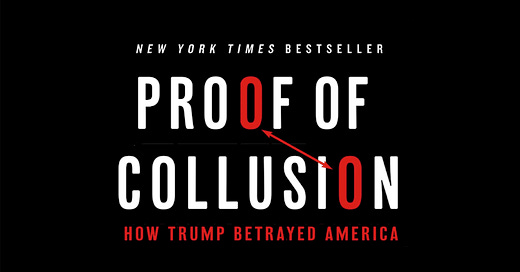



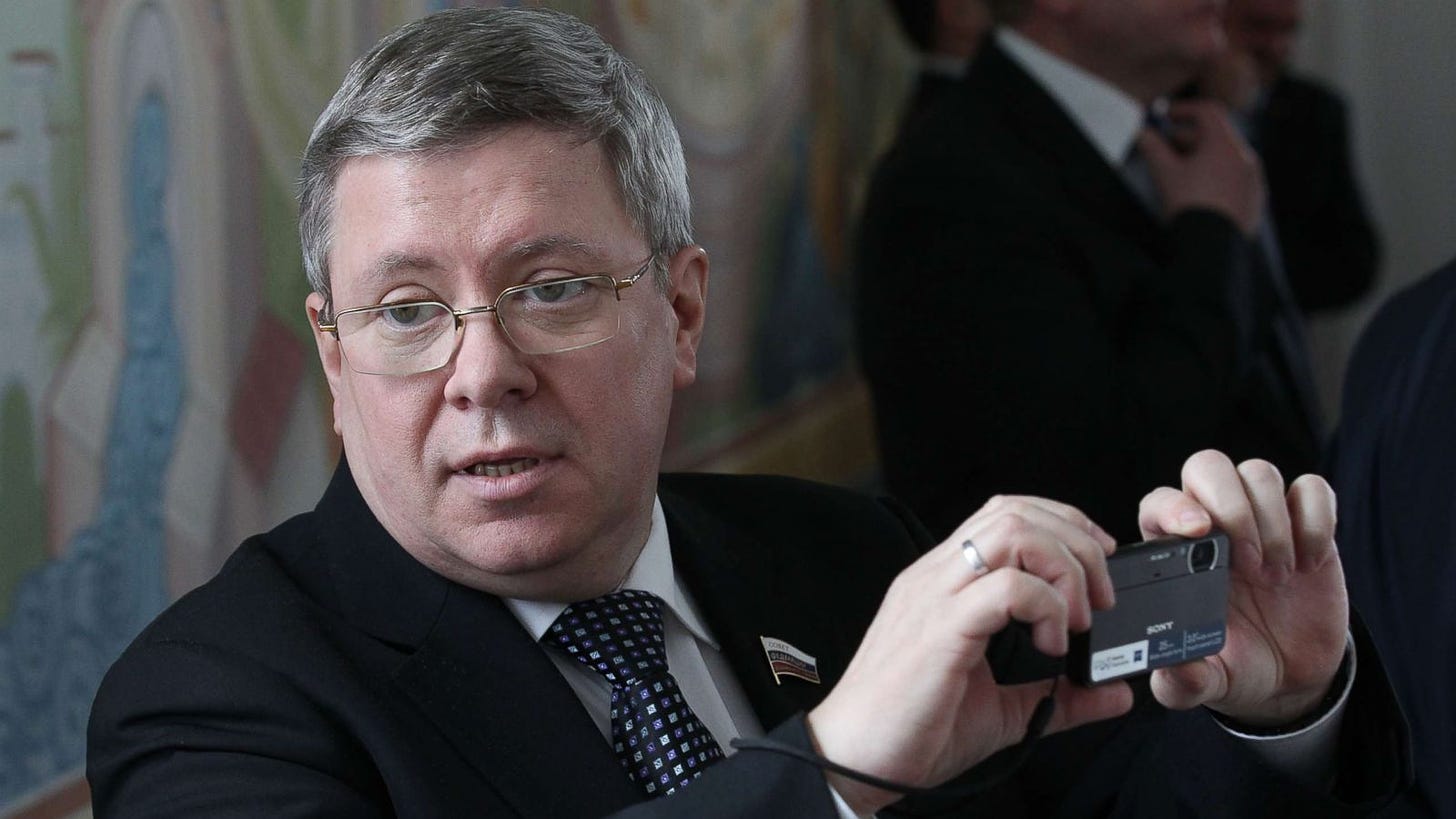
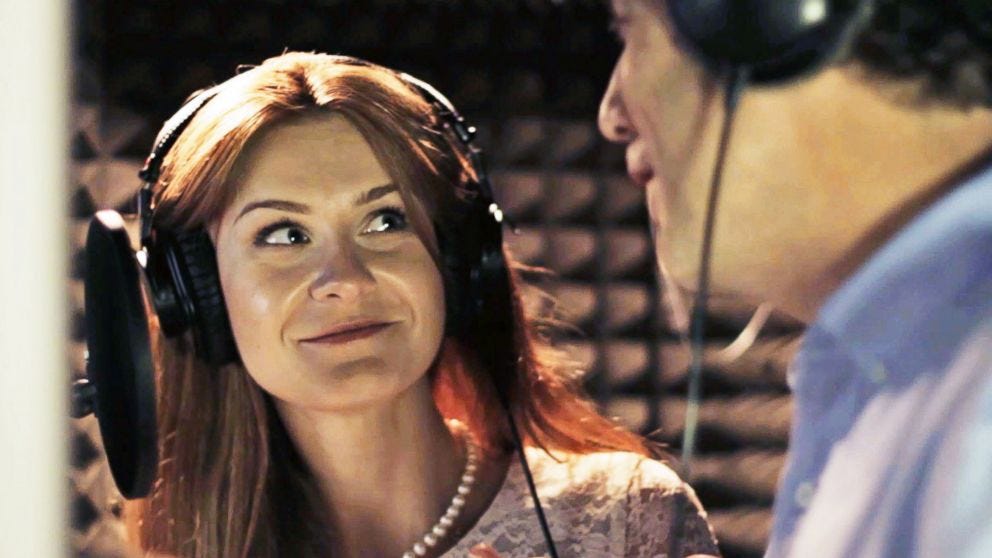
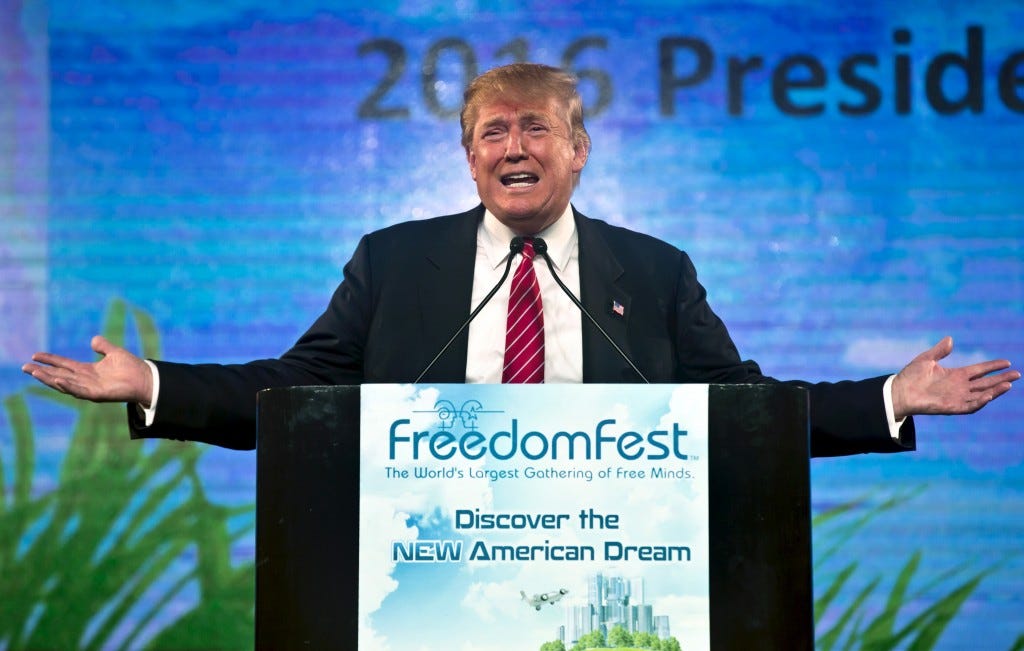
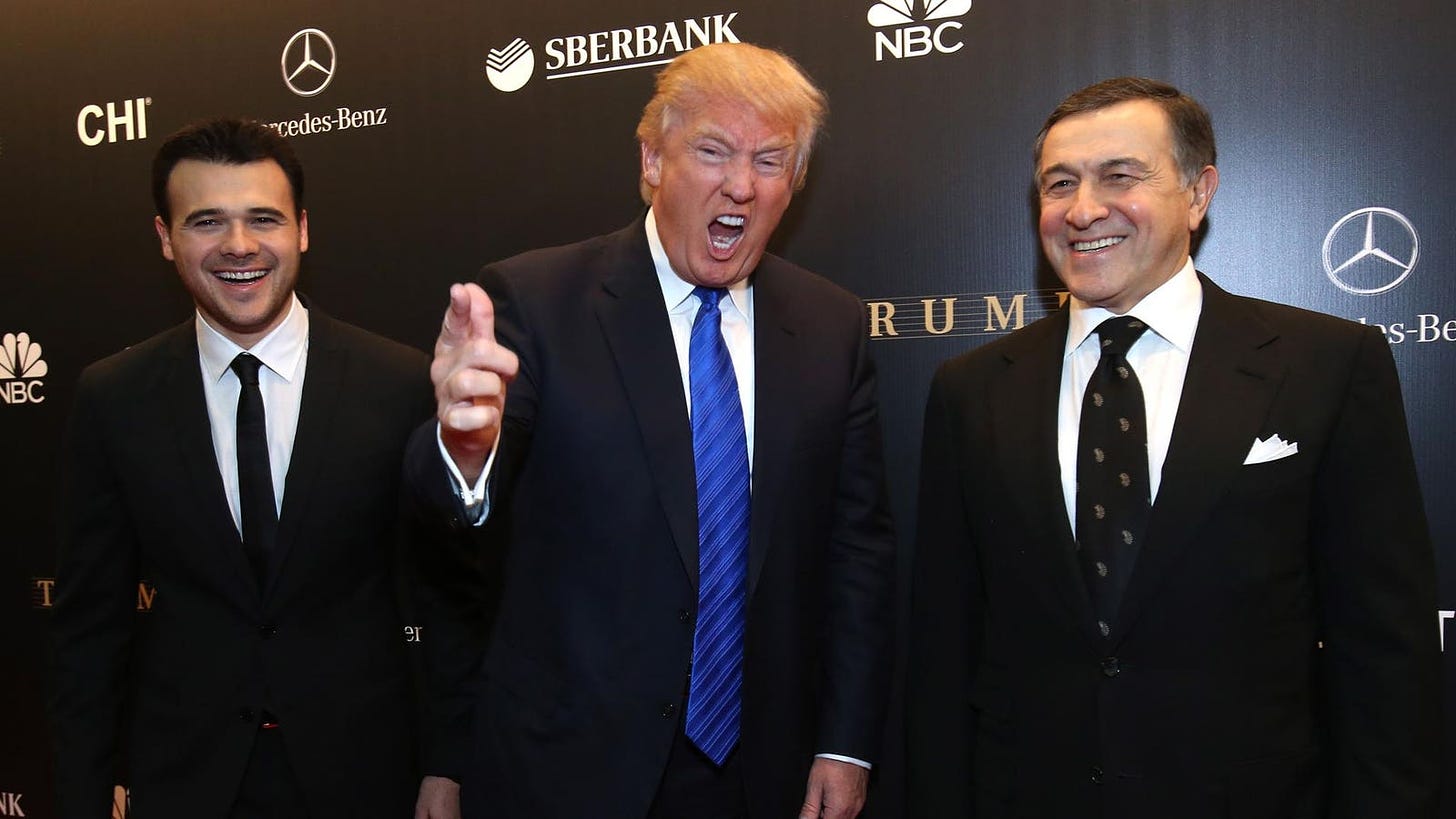
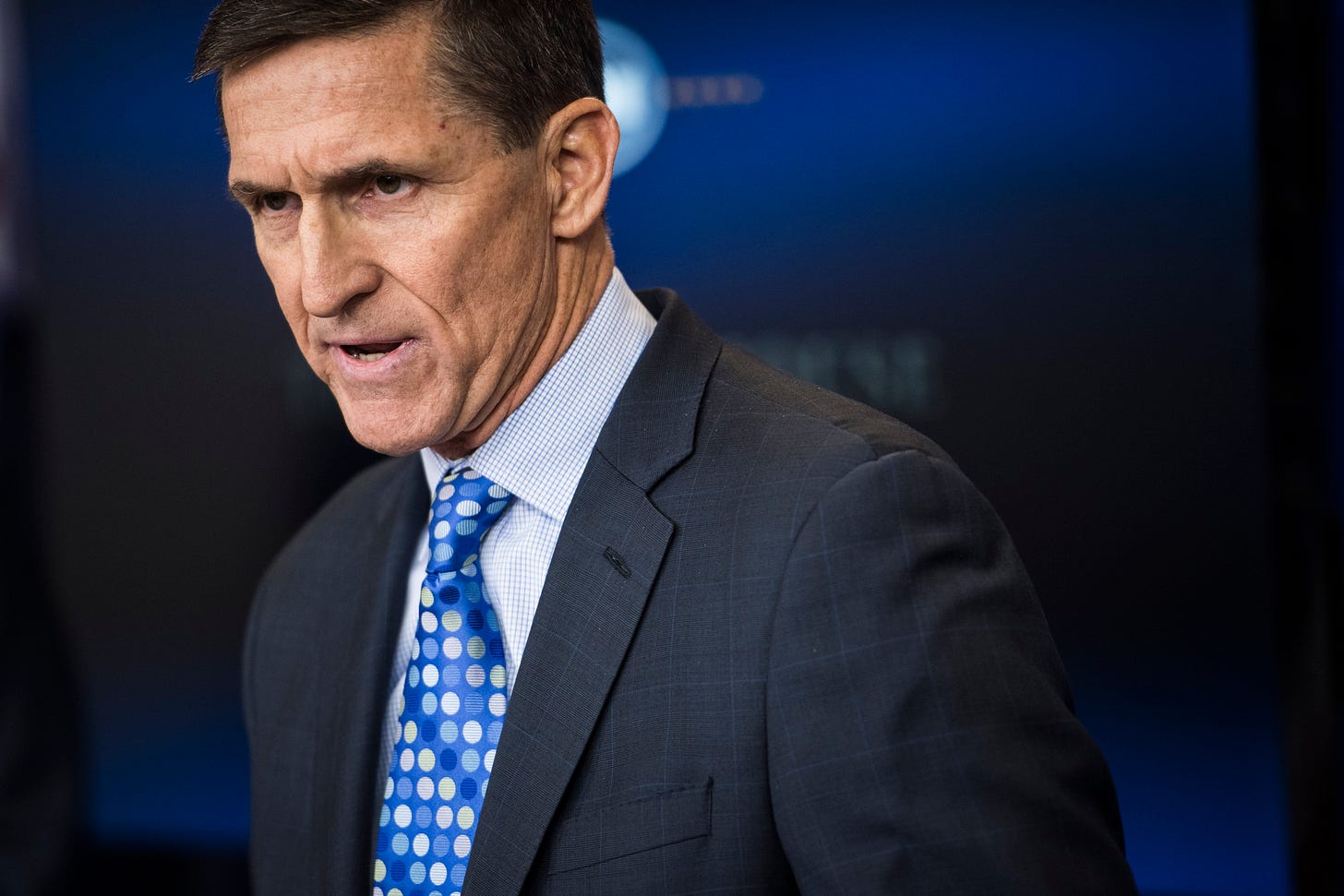
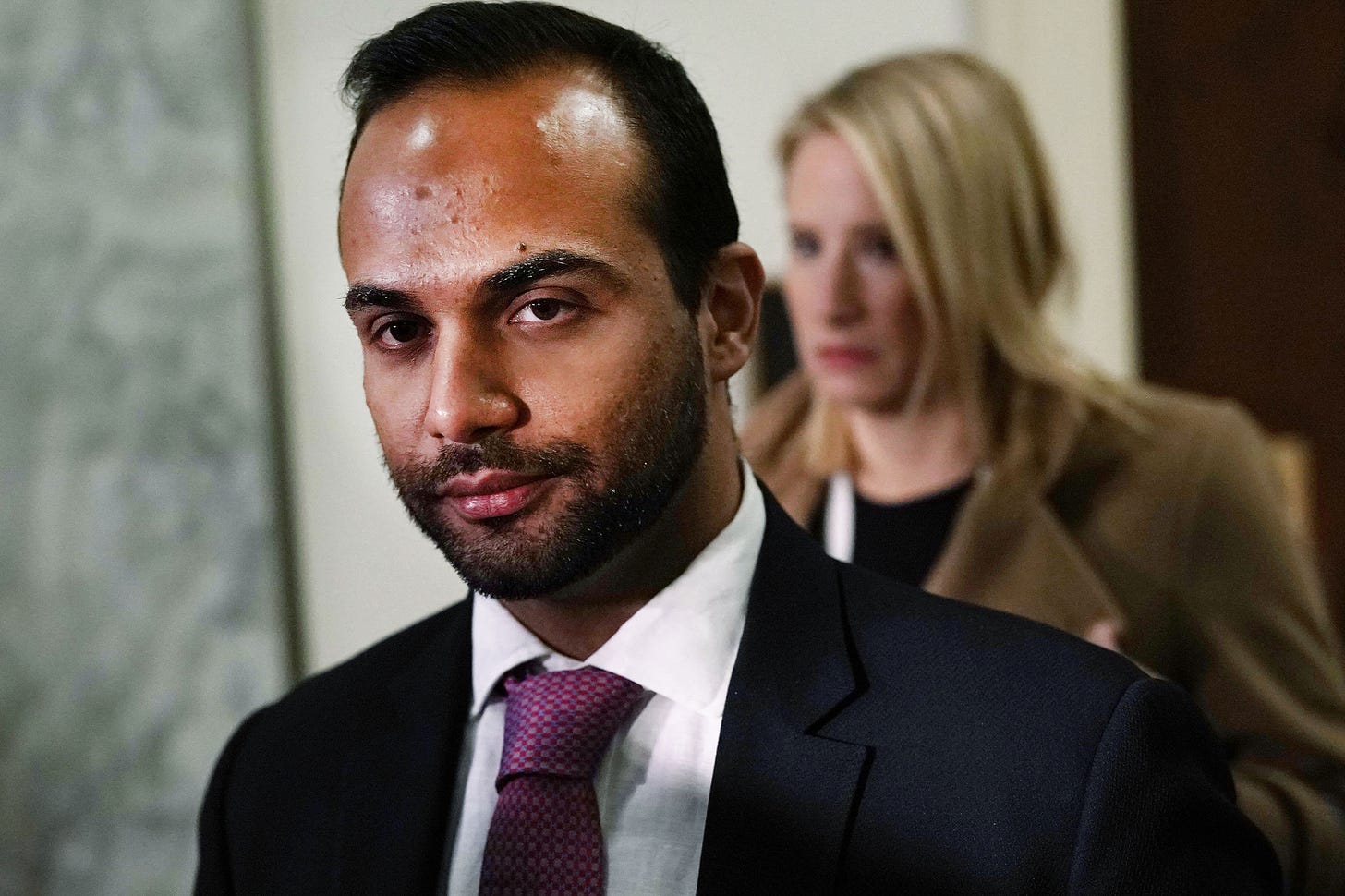
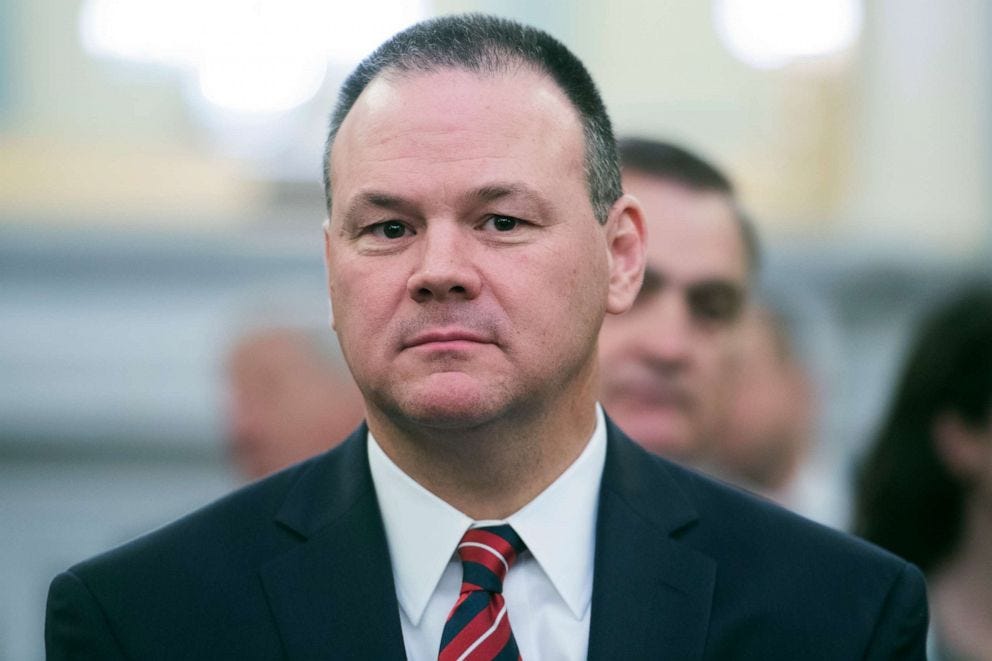
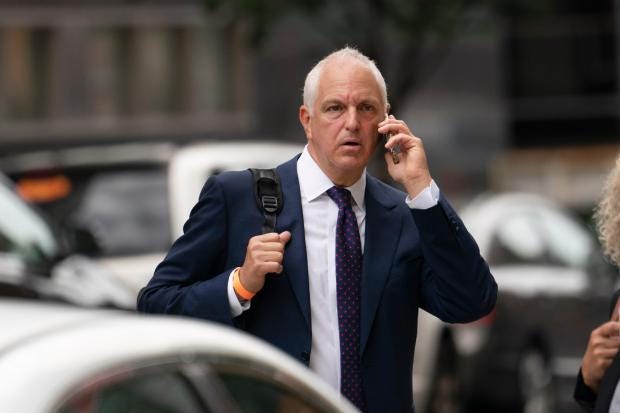
I still wish I understood why Chris Hedges thinks Russia was not involved in the 2016 election. That just boggles my mind. If you know anything, please advise. I don’t understand.
Why did all this information not sink into the empty heads of Republican voters? I'll never understand. The corruption is breathtaking, but it's also likely that there are already foreign actors working diligently to undermine Biden and put Trump back in office.